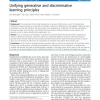Free Online Productivity Tools
i2Speak
i2Symbol
i2OCR
iTex2Img
iWeb2Print
iWeb2Shot
i2Type
iPdf2Split
iPdf2Merge
i2Bopomofo
i2Arabic
i2Style
i2Image
i2PDF
iLatex2Rtf
Sci2ools
109
click to vote
BMCBI
2010
2010
Unifying generative and discriminative learning principles
Background: The recognition of functional binding sites in genomic DNA remains one of the fundamental challenges of genome research. During the last decades, a plethora of different and well-adapted models has been developed, but only little attention has been payed to the development of different and similarly well-adapted learning principles. Only recently it was noticed that discriminative learning principles can be superior over generative ones in diverse bioinformatics applications, too. Results: Here, we propose a generalization of generative and discriminative learning principles containing the maximum likelihood, maximum a posteriori, maximum conditional likelihood, maximum supervised posterior, generative-discriminative trade-off, and penalized generative-discriminative trade-off learning principles as special cases, and we illustrate its efficacy for the recognition of vertebrate transcription factor binding sites. Conclusions: We find that the proposed learning principle he...
Related Content
| Added | 08 Dec 2010 |
| Updated | 08 Dec 2010 |
| Type | Journal |
| Year | 2010 |
| Where | BMCBI |
| Authors | Jens Keilwagen, Jan Grau, Stefan Posch, Marc Strickert, Ivo Grosse |
Comments (0)

